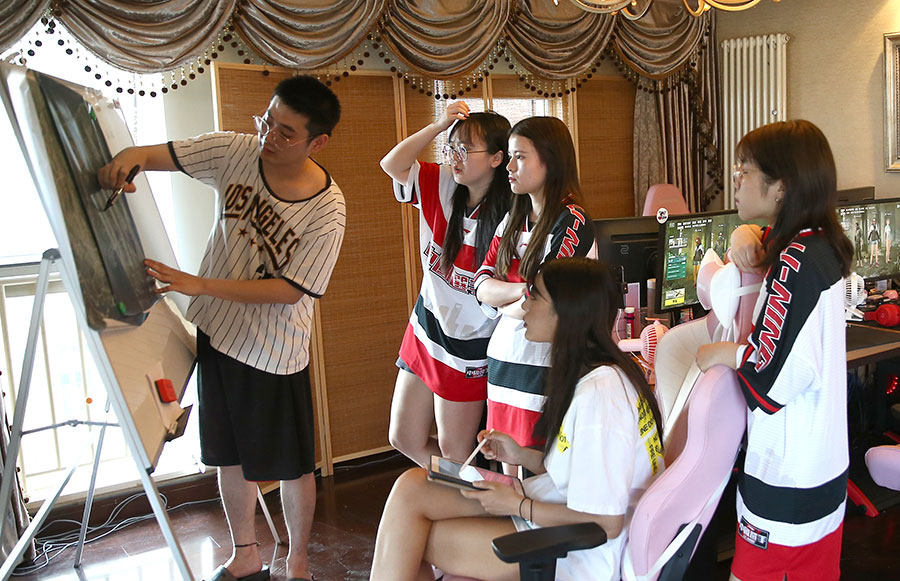Women becoming key consumers for esports


During the short breaks between games, the girls also enjoy talking about fashion and leisure.
Several minutes later when they stare at their computer screen again, the meticulous professional players work for the only goal that matters to them - to be the champions.
"It has nothing to do with gender," said Qian Yiqiu, 18 also known as Xin in the game PUBG. "We are all clear that it is teamwork and the most important is what you can do for your team."
As the youngest player in the club, Qian is now recognized as the best player in her team.
Qian gave up her college offer due to her family's financial situation and came to the club from her hometown of Suzhou, Jiangsu province, in June.
"I began to play shooter games in my first year in my senior high school and my mother didn't prevent me from playing," she said. "To reduce the burden on my family, I decided to become a professional player instead of entering college."
However, Qian's teammate Long Hongmin is not so lucky to get the support of her family.
Long, 23, came to the club after graduating from China West Normal University in June.
"I began to play PUBG in the university and became an anchor to play the game with fans after I bought my own computer," she said. "Some net friends of mine encouraged me to join in professional competitions."
Even though she was not all that confident, she had to try and posted a good result.
She began her professional esports career in her last year in the university while her classmates were busy with graduation practice.
"I dared not tell my parents my present job because I am sure they will never agree," she said. "I just told them that I found a job related with my major in the university in Beijing."
Now Long is the team's commander-in-chief and has more than 10,000 fans on live streaming platforms.
After about 8 hours' training, the girls will go running in the residential area.
"It is a simple and effective way for physical exercise and relieving the pressure," said Li Muzi, the manager and founder of the RE-Girls. "Sometimes, failure in games may bring them into a bad mood, so they need a way to release their emotions."
Li, 25, was once a professional player of Honor of Kings in a domestic esports club and got the idea to found her own club when she had different opinions on the team's transition.
"When the team began to participate in more commercial activities that paid attention to appearances instead of skills, I decided to leave," she said. "Fortunately, I received support from some friends who became my co-founders later."
They have the same idea that being competitive in games is of the utmost importance.
"Compared with male players, female players have a slight advantage in dealing with details while they seem a little weaker in facing mental challenges," said Li.
"There are no obvious gender differences in esports," said Xu. "Everything is based on strength and performance in the games. We have to seize every opportunity to participate in competitions that can help improve the level of our players."
"It is proverbial that esports players' professional career is shortlived, with body reflexes said to become dulled when they reach 21," said Li. "We are making an effort to develop related positions for those who are unwilling to leave the esports industry, such as game commentator and anchor."
Esports has made its name worldwide. In 2003, China has listed esports as an official sport.
Esports will be an official medal sport at the 2022 Asian Games in Hangzhou after being added as a demonstration sport at the 2018 Asian Games, the Olympic Council of Asia announced in April.
China's gaming industry generated sales revenue of 214.44 billion yuan in 2018, up 5.3 percent year-on-year, a report from GPC and Gamma Data Corp said.
The report also said there were 626 million game players in China, an increase of 7.3 percent from 2017.
Kenneth Fok, president of the Asian Electronic Sports Federation, told Xinhua after the 2018 Asian Games that the organization was striving to build a bridge for esports to become a mainstream sport.
"In fact, esports has a broad audience and should be presented on a higher platform," he said. "Mature concepts and norms from the higher platforms - such as esports athletes also need self-discipline in regular life, strict training and diet - can guide esports to be more stable, better developed and accepted by more people and families."
Gamma Data noted in its report that among all players, more than half are aged under 25, with many born after 1995 and in the 2000s. Compared to those born in the 1990s, those born in the 2000s are more active in the game market.
"Esports is welcomed by young people and growing rapidly, so it's important to let the young people involved have their voices heard and to help them find their way in the profession," he said.
Ye Qian contributed to the story


















